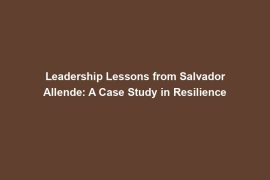Hey there, history buffs! Today, we’re diving into the world of Augusto Pinochet, the former dictator of Chile whose authoritarian regime left a lasting impact on the country.
Pinochet’s rise to power in Chile was nothing short of dramatic. He came to power through a military coup in 1973, overthrowing the democratically elected government of Salvador Allende. Pinochet’s leadership style was characterized by strict control and a heavy-handed approach to governance, which had a profound effect on Chilean society.
In this blog post, we’ll be delving into the leadership lessons that can be learned from Pinochet’s authoritarian regime. We’ll explore how fear and control were central to Pinochet’s rule, and the implications for both the regime and the society at large.
So buckle up, folks, as we take a closer look at how Pinochet’s leadership style can teach us valuable lessons about the dangers of authoritarianism, and the importance of ethical and inclusive leadership practices in the modern world. Let’s get started!
The use of fear and control in leadership
Now let’s dive into how Augusto Pinochet wielded fear and control to maintain power during his authoritarian regime in Chile.
First off, Pinochet was not one to shy away from using fear tactics. His rule was characterized by repression, censorship, and violence as a means of silencing dissent and instilling fear in the populace. This fear was a powerful tool that allowed Pinochet to keep a tight grip on his power.
Additionally, control over information and communication played a crucial role in Pinochet’s leadership style. By closely monitoring and controlling the flow of information, Pinochet was able to manipulate the narrative and shape public opinion in his favor. This control over communication channels allowed Pinochet to suppress opposition and maintain a sense of control over the population.
But while fear and control may have helped Pinochet stay in power, the long-term consequences for Chilean society were severe. The stifling of dissent and the suppression of alternative viewpoints led to a culture of fear and mistrust. The lack of freedom of expression and the restriction of information hindered the development of a vibrant and open society.
Evaluation of the effectiveness of fear and control in leadership
As we reflect on Pinochet’s use of fear and control, it is important to consider the ethical implications of such tactics. While fear and control may yield short-term results in terms of maintaining power, the long-term effects can be damaging to both individuals and society as a whole. The erosion of trust, the suppression of creativity, and the violation of basic human rights are just some of the consequences of authoritarian leadership.
In the next section, we will delve into the dangers of authoritarian leadership as we explore the negative effects of Pinochet’s regime on Chilean society. Stay tuned!
Examining the dangers of authoritarian leadership
Now that we’ve delved into how fear and control were used by Augusto Pinochet to maintain power, it’s important to confront the negative effects of his authoritarian rule on Chilean society. Pinochet’s iron-fisted leadership style led to widespread human rights abuses, political repression, and economic inequalities in Chile. Dissent was not tolerated, and those who dared to speak out against the regime often faced imprisonment, torture, or even death.
Exploring the dark side of authoritarian leadership
When analyzing Pinochet’s reign, it’s crucial to acknowledge the parallel with other authoritarian leaders in history. From Stalin to Mussolini, the world has seen its fair share of dictators who ruled with an iron grip, leaving destruction and suffering in their wake. By drawing these comparisons, we can better understand the dangers of unchecked power and the importance of safeguarding against authoritarian tendencies in leadership.
Lessons for modern organizations
So, what can we learn from Pinochet’s authoritarian regime? The most important takeaway is the need for ethical and inclusive leadership practices in modern organizations. By studying the pitfalls of authoritarianism, we’re reminded of the importance of transparency, accountability, and respect for human rights in leadership. Instead of ruling through fear and control, effective leaders should strive to empower their teams, foster open communication, and promote diversity and inclusion.
As we reflect on the lessons of Pinochet’s leadership, let’s use this knowledge to drive positive change in our own organizations. By embracing ethical and inclusive leadership practices, we can create a more just and compassionate world where everyone has the opportunity to thrive.

